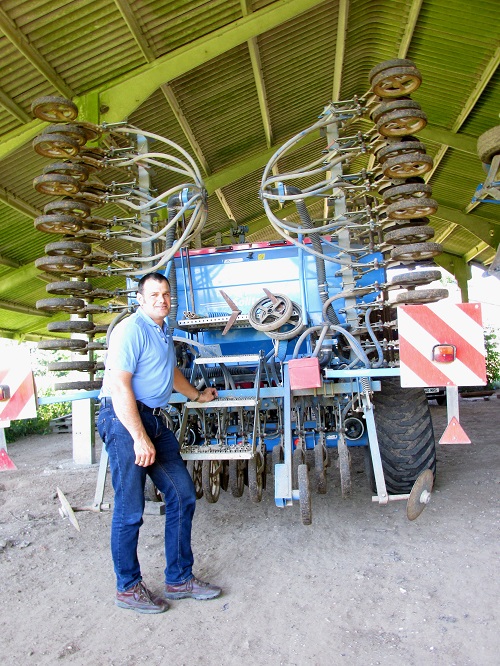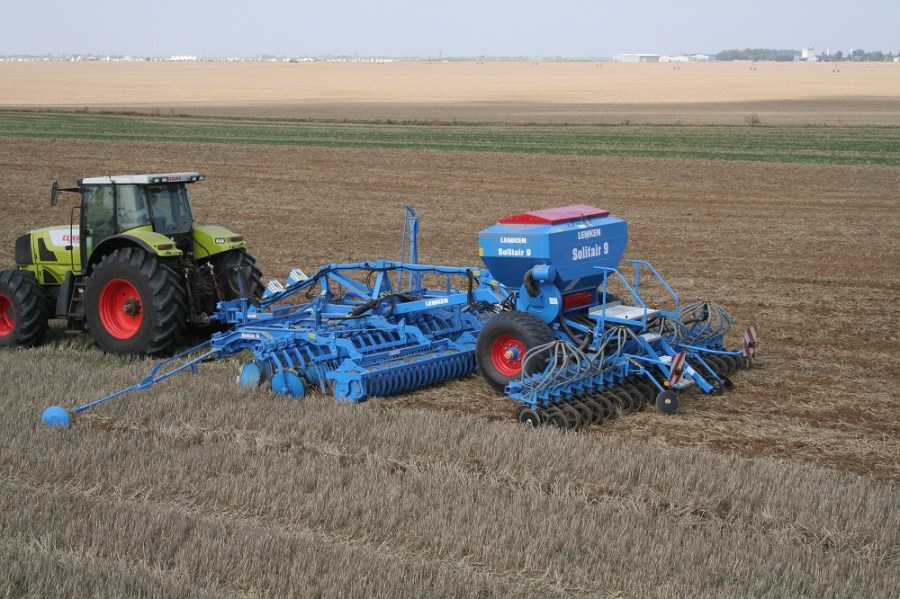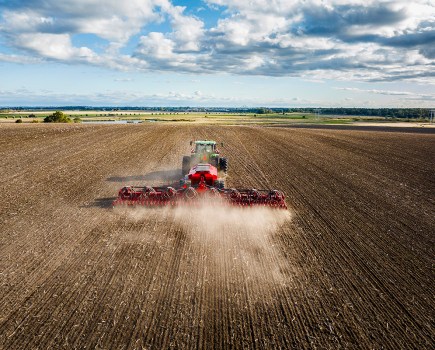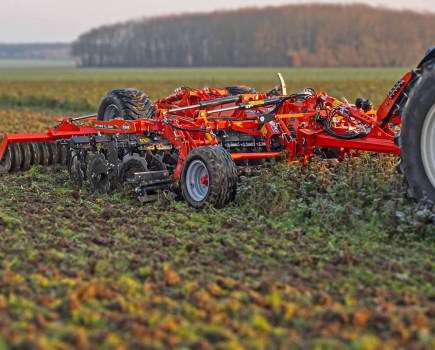With some tough soils and the need for flexibility, one Hants grower is finding Lemken’s system, built around the Solitair drill, fits in well. CPM paid him a visit.
The Lemken drill is a good all-rounder – we’ve even drilled maize with it.
By David Jones
Flints the size of your head are not an unusual find in parts of Hants. For Mark Glover, these are among the challenges he faces when selecting drill and cultivation equipment.
He farms a total of 860ha – as owner, contractor and by informal agreement – based between the villages of Over Wallop and Palestine, in the north-west corner of Hants. The owned land, at Blackbarn Farm, extends to 300ha and lies on Andover series chalk that provides all of 200-250mm of top soil to work with.

Mark Glover finds his 6m Solitair drill suits his system and his soils well.
The contracted area totals 200ha at nearby Stockbridge, which he describes as a “heavy, gravel parkland estate”, while the remaining 360ha belongs to a local family well known to him and has only recently been taken on.
To handle the increased workload he’s had to make one or two changes to his machinery fleet, most noticeably, so far, with regard to the farm’s combine harvester, which is now an ex-demonstration Case 8240 Axial-flow tracked machine, with a 10.7m table and auto-level, that he feels will be able to cope with some areas of wetter ground and a considerable hill.
Trusted assessments
Prior to changing machines, however, Mark Glover generally adheres to a policy of consulting those who are going to be operating them for most of the time they’re in the field. He puts his trust in the assessments made by the two full-time staff at Blackbarn Farm – who, he stresses, are “second-to-none” with regard to brand and model selection – and, more recently, his middle son. Completing the team is Mark Glover’s wife Helen, whom he describes as “wonderfully supportive”, playing a key role in the business, running the administrative nerve centre – otherwise known as the farm office.

The drill can be used in tandem with a Lemken Kristall 6m cultivator, and go straight into the stubble.
“The staff ensure that the warranties and servicing schedules are kept up to date on most of the machines, as it’s clearly in their interests to do so,” he explains. “They also have a say with regard to the level of specifications with many of the machines we buy, as, by and large, they are the ones spending the greatest amount of time in them.”
When it comes to drills and cultivation equipment, though, Mark Glover knows what he wants. “I do most of the drilling,” he explains, “and that means hitching up with a Lemken. The first Lemken drill that I used was a 4m model about 15 years ago. We had tried other drills before and since but none of them suited our system as well as that one.
“There’s no drill that can do everything, but we’ve got some variable, and some quite difficult, ground, and the Lemken is able to cope with it. For the past couple of years, we’ve been using a semi-mounted Solitair. It often gets used with a set of 6m discs, which we can also take off and use separately.
“Between the two of them, they’ve covered a lot of ground, some of it pretty heavy or trashy, so they’re not small discs. You do sometimes get a bit of sideways movement, as there are some very large lumps of flint on this land, but you get to know the degree of offset to run at to minimise the effect.”
Since the Solitair was delivered to Blackbarn, Mark Glover has decided to buy a Lemken Kristall 6m cultivator – with 13 tines and wide feet – which can also be used in tandem, ahead of the drill. “We’ve been really impressed with that,” he reports. “It’s a quite incredible piece of kit. On the lighter ground, and even on some of the heavier stuff, we can drill straight into the stubble. We have also used crumbler rollers that can overcome difficulties caused by the flints.
“The crumbler rollers form part of the cultivator – be it Rubin or Kristall – and help to create a good seedbed. The original Kristall had a packer roller on it that turned out not to be suitable, so, after trying several others, we changed to the crumbler rollers. Having this combination has generated a lot of contract work for us locally and it has saved both ourselves and our neighbours a considerable amount of money.”
So would he have been better off investing in a direct drill? “Does spending £120,000 on one machine represent a sound investment? It’s the bottom right hand corner of the farm accounts that matters. Modes of drilling come into and go out of fashion, but we’ve always tended to do our own thing. I suppose the only drawback is that we can’t apply fertiliser at the same time, but, at the end of the day, the Lemken does exactly what it says on the box and you can’t argue with that.”
Excellent relationship
An “excellent relationship” has developed with the manufacturer over the years, he says. “What they want is for you to get the best out of their kit. For a start, the machines are made of high-tensile steel – not mild steel, like some other brands, and that does make a difference.
“They brought out a packer roller to demonstrate. ‘Try this,’ they said, but it turned out not to be the answer. So they then brought over one which had crumbler rollers, and it was ideal. They do go the extra mile. Initially, the local distributor for Lemken kit was Romsey Agricultural Machinery, but they closed down as a result of retirement and we now deal with Claas Western at Micheldever, who are very good.”
The rotation at Blackbarn Farm involves winter wheat, winter barley, oilseed rape and a green cover crop – this year’s candidate being oil radish. This option, Mark Glover explains, has been found to be especially useful in helping to control blackgrass.
“We combine, bale, remove the straw, disc lightly – just to 25-50mm – get a chit and spray off. Then we go over it again with a deeper discing, spray off, then drill. However, with the Solitair we can make do with just a single chit pass – it does work.
“We started with a Lemken plough 30 years ago, but the beauty of the Solitair is that we can put a power harrow or a leveller in front of it if we want to, meaning we save on passes. It’s a great modular system – and it’s helped us to pick up more business as a result.”
If it’s ever considered at Blackbarn that a return to the plough would deliver benefits, then Mark Glover would be unlikely to hesitate. “If that situation ever arises, we’d have to use a Lemken. It’s a company you can rely on, helped by the fact that their people tend to stay with them for a long time, which means you can build a relationship that lasts.
“The Lemken drill is a good all-rounder – we’ve even drilled maize with it – that suits this farm and the others that we work, and if we can reduce the number of passes required for any operation, then we save money and our customers save money.”
Planting for the future – and diversification
Over the past 15 years, a steady programme of woodland regeneration has been implemented at Blackbarn Farm, which, to date, has resulted in an additional 12ha of mixed species being planted. However, more recently, on some of the less productive ground – corners of fields, for example – Mark has started growing walnut trees – so far planting some 700 of them.
“It’s not just because we like walnuts, but partly in response to the vast acreages of groves in California that have been grubbed up in response to the water problems they’ve been experiencing there in recent years. We seriously believe there’s money to be made here.
“We’re aiming to make it a commercial venture and have earmarked other suitable sites around the farm for a further 2000 trees in the foreseeable future, with maybe more beyond that.”
Drill performs agronomy role
Attention to detail represents a large part of Mark Glover’s farming process and the dwindling chemistry available to arable farmers is, he believes, a serious cause for concern. He’s long been convinced of the commercial wisdom of outside advice and expertise relating to soil management and agronomy, and has been a customer of ProCam for a number of years.
For much of that time he’s been receiving agronomic guidance from Swaran Bachoo, whose role at Blackbarn Farm (having announced his impending retirement) is being taken up by Andrew Cowan.
Over the years of his professional involvement in the agronomy at Blackbarn Farm, Swaran Bachoo has recommended and overseen a number of changes aimed at minimising the effects of weed competition and to stay one step ahead of the diminishing number of chemical control options.
“It’s vitally important to establish a crop with an even drilling depth,” he asserts. “This ensures that the crop has a rapid start and allows it to tiller quickly. It needs a deep root structure and the ability to compete with grassweeds. The Lemken drill helps to achieve this marvellously.
“Blackbarn Farm does not have a serious blackgrass problem, but any other means that help in the control of blackgrass – other than chemical inputs – is very useful.
“The lack of insecticides for the control of flea beetle in oilseed rape makes it critically important to establish the crop quickly and get it safely beyond the three-leaf stage. A wide-rowed, evenly drilled seed to a controlled, even depth is imperative.”
Another trial exercise being carried out here is aiming to boost yields of winter wheat, using the feed variety, Dickens, from its current farm average of just under 10t/ha. “By increasing certain input rates slightly – nitrogen (including varying the timings), growth regulators and fungicides – the trial is targeting a jump to 13t/ha,” Swaran Bachoo explains.
Farm facts
Blackbarn farm, Over Wallop, Stockbridge, Hants
- Farm size: 860ha
- Cropping: winter wheat, winter barley, oilseed rape
- Soil type: Andover series chalk with high flint content
- Mainline tractors: Case Magnum 335; Puma 230; John Deers 6920
- Combine: Case 8240 Axial-flow, with 10.6m cut and tracks
- Drill: Lemken 6m Solitair
- Cultivation: Lemken 6m Kristall tined cultivator; Rubin 8m disc harrow; Kongskilde 5m Vibroflex; 4m power harrow; 3m subsoiler; Twose 10m rolls
- Sprayer: RoGator 618 30m sprayer, applying pesticides and liquid fertiliser
- Loader: Manitou 840 telehandler
- Fertiliser spreader: Kuhn Axis




